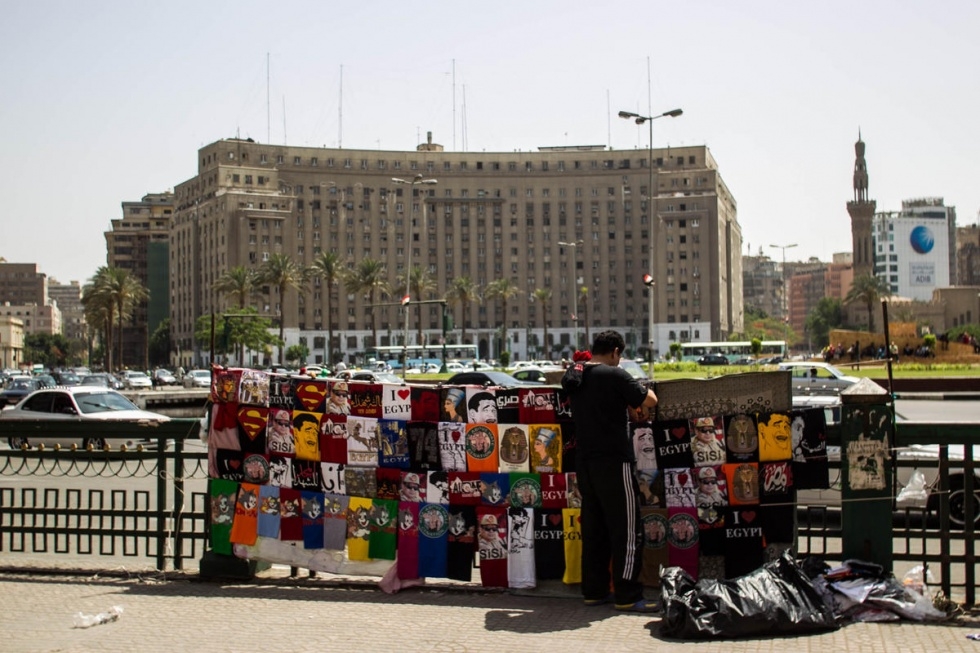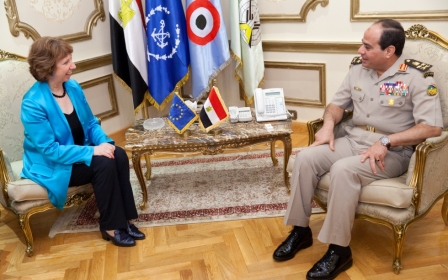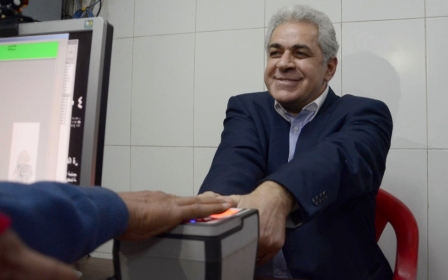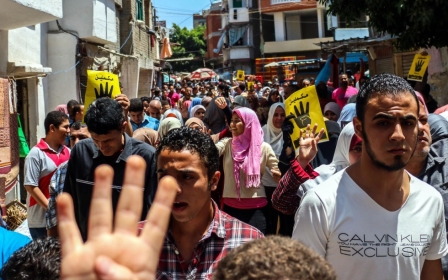A new city of the dead in Egypt

The City of the Dead in Cairo is an ancient graveyard that for decades has been home not only to the dearly departed interred there, but for their relatives as well. The mausoleums not only house the dead, but one million family members who are some of the most marginalised people in Cairo.
It is not unusual for generations of family members to be undocumented- without birth certificates or identity papers. Many never attend a school. To the government, these people are not only dead - they never existed in the first place.
In the run up to the first election since the military coup overthrew the Morsi government, former army chief Abdel Fattah al-Sisi has made no electoral promises and guaranteed only one thing - that the going will be more difficult for Egyptians in the coming years.
In Cairo, the pictures of Sisi are everywhere - from the shops in old Islamic Cairo, to the bridges over the highway, to the buildings downtown, they are plastered on taxis, donkey carts, and Mercedes automobiles. The slogans range from “Egypt is my mother and Sisi is my father” to “The Lord Jesus invites you to vote for Sisi in order to bring to an end the Muslim Brotherhood”, (when churches burn it may be important to remember this one).
It was most disheartening to see banners hanging high above Tahrir Square, the birthplace of the revolution. The place where Egyptians of every sort gathered and talked about change and what they hoped for their kids in the new Egypt - the Egypt they were imagining together. An Egypt free of the Mubarak regime and their cronies, free of the corrupt business elite, and free of the military’s influence over the government.
Tahrir Square, whitewashed and sanitised like all the massacre sites around Cairo, holds no hint of the young people who gave their lives for their country and their dreams. They too never existed. In the centre of the square sits a monument to the martyrs erected by the hypocritical coup government, defaced the day it was unveiled, today a tombstone for the revolution. All of Cairo is a graveyard, a new City of the Dead and Sisi’s visage looks down on it all.
Outside several polling stations around the pro-military Abassaya neighbourhood the atmosphere was festive and the cult of personality that surrounds Sisi was in full bloom. The young men and women who spear headed the revolution were visibly absent. Parents and grandparents, with children in tow, danced and waved flags, holding up their hands with the now ubiquitous dyed finger.
They wore t-shirts emblazoned with portraits of Sisi, and sang along to the blaring sound systems and the honking horns. They posed for photos with policeman and soldiers - some of them undoubtedly responsible for the murders of their countrymen at Mohamed Mahmoud St, Abassaya Square, Tahrir and Rabaa and they voted for the man who orchestrated their deaths. The chants of “Down with SCAF” and “No to Military Rule” echoed deep in my heart, but the voices that raised this cry in the streets of Cairo and throughout Egypt have been murdered, imprisoned, or silenced with threats.
Early returns show Sisi winning the election against his only opponent, Hamdeen Sabbahi with 90% of the vote. Not one poster of Sabbahi adorns any walls in Cairo. He is invisible too. You see he lives in the new city of the dead.
The turn out on Monday was so low Tuesday was declared a national holiday in order to get the vote out, when that failed, voting was extended for an additional day. The news anchors of the state sponsored news channels, some with tears in their eyes, implored people to vote. In 2012, election officials said 50% of the electorate turned out to vote in the government Sisi overthrew. Preliminary counts of voter turnout on Monday show an anemic turnout of 6.5%.
It will be difficult to claim a mandate of the people or even a legitimate election if this number doesn’t improve. As I sit writing this, pictures of empty polling stations around the country are crossing my newsfeed. Trucks circle the neighbourhood with sound systems cranked up, exhorting people to vote. The City Stars Mall, the largest mall in Cairo has been closed and people are being told to leave and go vote.
This will not deter the Western election observers from declaring a “clean” election. This will not deter US President Barack Obama from declaring Sisi the legitimate leader of Egypt and renewing the military cooperation that never really ended in the first place- just last month the US delivered 10 Apache attack helicopters to the coup government- they will be used against the Egyptian people living in the Sinai.
No US Congressperson will raise their indignant voice to remind the American people that Sisi, like Saddam and Gaddafi and Assad, has killed his own people and should be removed from power. Senator John McCain will not stand with the protesters demanding the ouster of Sisi. Assistant Secretary of State Victoria Nuland will not be delivering cookies.
Protests have been banned and the crackdown has been harsh - estimates vary widely as to those detained. Wiki Thawra announced that 41,000 people have been detained, many without trials, or sham trails- some courts sentencing hundreds to death in a matter of minutes. Included in the arrests are (mostly local) journalists attempting to alert the world to the situation in Egypt.
Most of the major Western media outlets have disappeared - the aftermath of the coup is a lot less photogenic than the spectacle of the “Arab Spring”. Independent journalists are under threat, and largely absent. On Friday three anti-government protestors were killed and dozens injured and arrested in protests around the country (which went unreported in Western media) by a police/military force that has killed thousands of citizens with immunity since the coup in July 2013.
So it will be back to business as usual in Egypt. The election will be hailed as a democratic success. The average Egyptian will continue to suffer with a lack of food, poor sanitation, poor infrastructure, terrible schools, and decrepit hospitals. Government employees, doctors, nurses, and teachers will continue to receive a pittance for their labour. Others will scramble to survive. The crackdown will persist. Thousands will remain in detention and more will die. Sisi will move into the palace. Exchanging his uniform for a business suit, he will take Mubarak’s place at the trough.
The revolution, once the hope of tens of millions of ordinary Egyptians and people throughout the world, is buried. But those who live in the new city of the dead exist and they will not remain invisible forever.
- Johnny Barber is a writer and freelance photographer.
The views expressed in this article belong to the author and do not necessarily reflect the editorial policy of Middle East Eye.
Photo credit: Banners of president candidate and former Defence Minister Abdel Fattah el-Sisi are seen on the Tahrir Square before the presidential election in Cairo, Egypt on 17 May, 2014 (AA)
Middle East Eye propose une couverture et une analyse indépendantes et incomparables du Moyen-Orient, de l’Afrique du Nord et d’autres régions du monde. Pour en savoir plus sur la reprise de ce contenu et les frais qui s’appliquent, veuillez remplir ce formulaire [en anglais]. Pour en savoir plus sur MEE, cliquez ici [en anglais].





